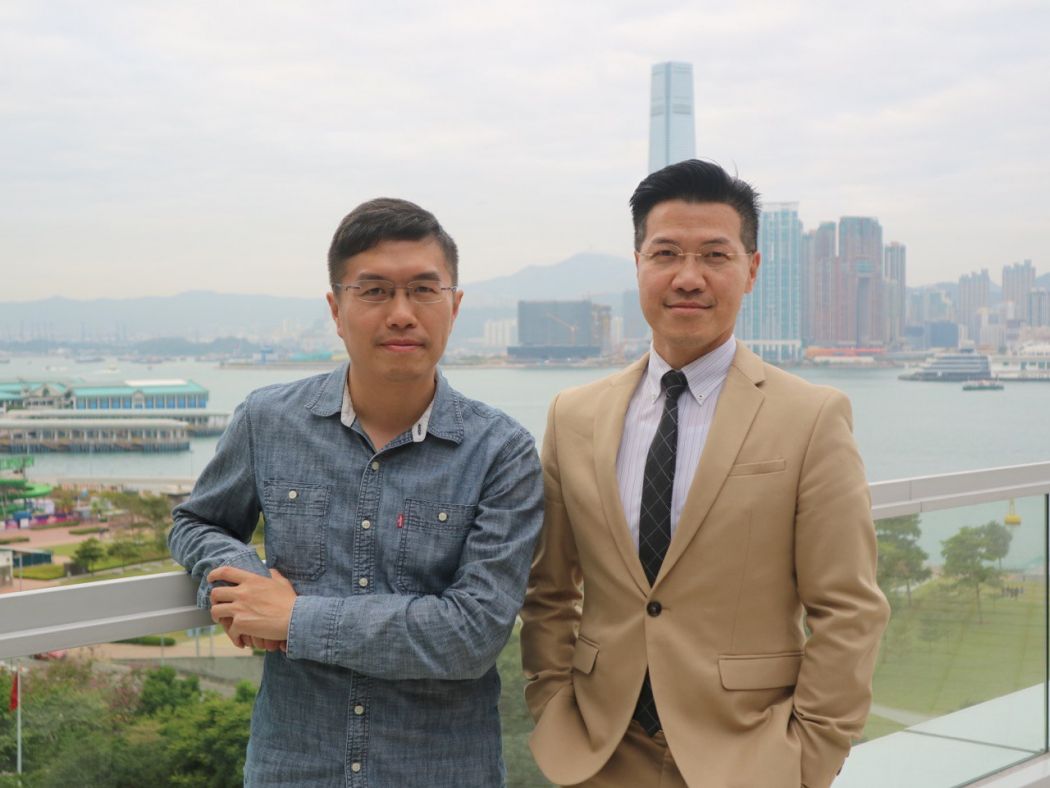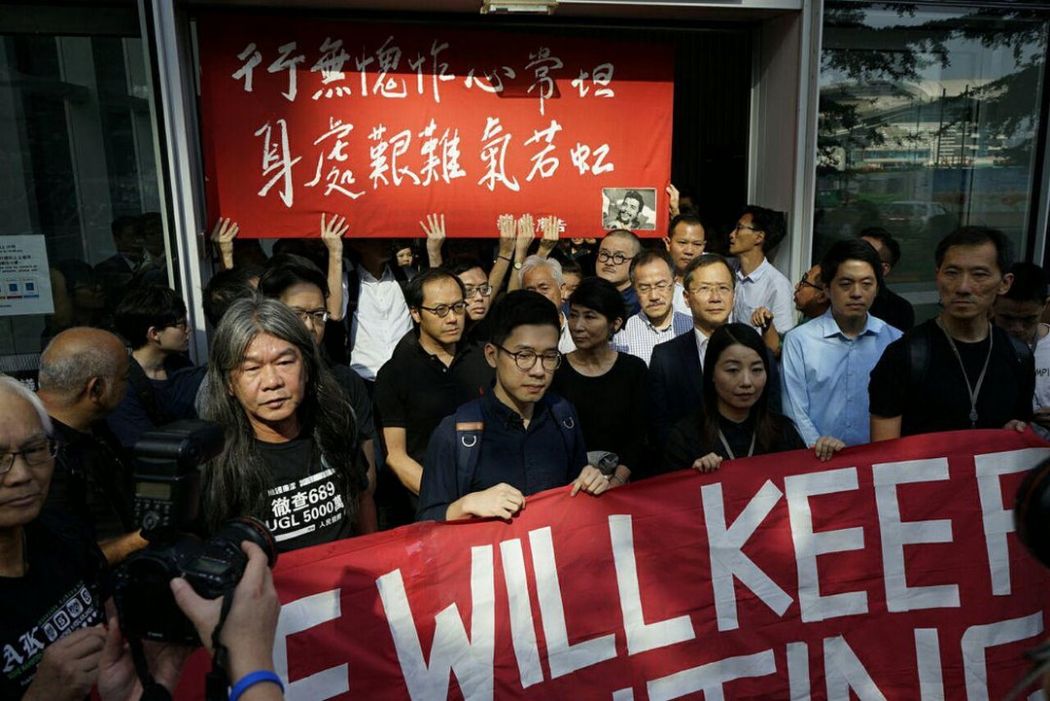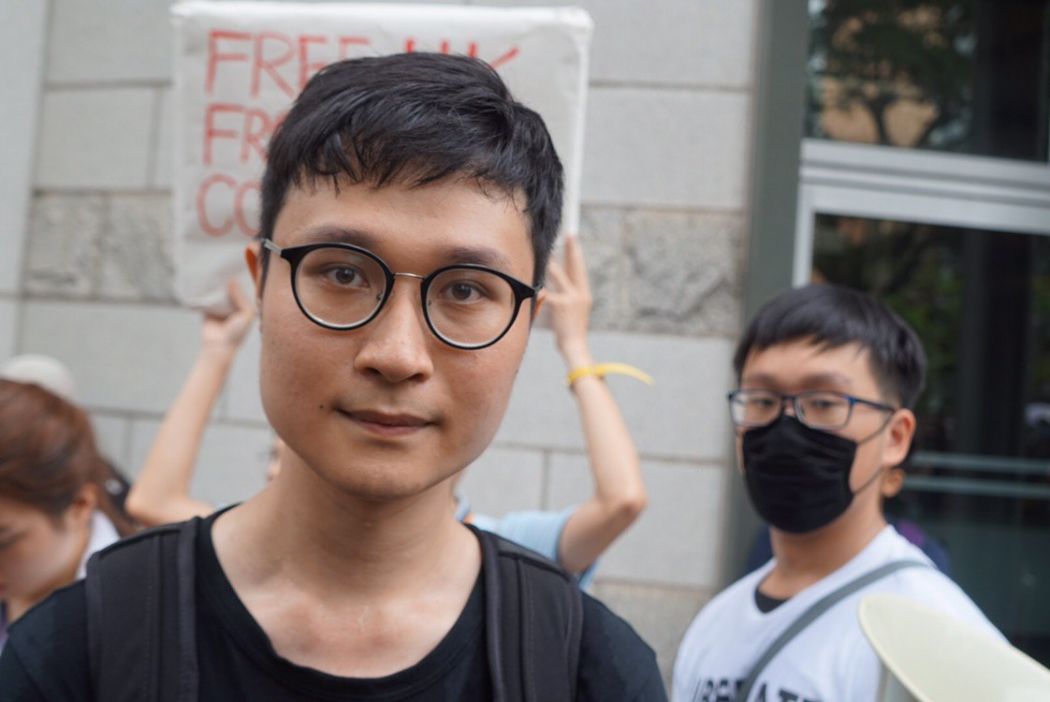For anyone still wondering why Hong Kongers are angry enough to do what they have done during the past six months, two more aggravations can be used to illustrate the answer.
The latest provocations concern two elected pro-democracy Legislative Councilors, Au Nok-hin and Gary Fan Kwok-wai. They have just joined the group of those disqualified during the council’s current 2016-20 term.

All the disqualifications were a direct or indirect result of the oath-taking saga and the intensified political vetting it precipitated.
The controversy began in October 2016, when newly elected councillors embellished their oaths-of-office during the swearing-in ceremony following the September 2016 Legislative Council (LegCo) election.
Counting these two latest additions to the list, altogether eight Legislative Councillors have been removed from office in the sequence of events that has carried on throughout the present council’s 2016-20 term. The next regular LegCo election will be held next September.
Last summer, when the current protest movement began, attention was focused on the council because of pro-democracy legislators’ inability to block the government’s much-feared extradition bill. Among the points made by demonstrators then was one directed specifically at the string of disqualifications that had left legislators powerless to block the bill.
The message from protesters then: legislators may be removed, but their voters are all still here, and we are the voters.
That point emerged front and centre on November 24, when voters used the District Councils election as payback time and gave an unexpected landslide victory to the protest candidates’ defiant united democratic coalition. No one expected that ordinary voters would remain focused on so mundane a matter, especially given the violent distractions carrying on all around them.
Nevertheless, there are now two additional sets of disenfranchised voters added to all the others. Councillors Au and Fan have just been disqualified by a final decision from Hong Kong’s highest court, and ordered to vacate their council offices within a month.

What offence might they have committed to warrant such drastic retribution? In fact, according to the standards used by vetting officers for the most recent elections, Au and Fan are blameless.
But the convoluted world of Hong Kong’s electoral system is designed to Beijing’s specifications and implemented according to its evolving definitions. The system is applied by Hong Kong civil servants and enforced in accordance with the Hong Kong judiciary’s common-law standards. The two elected legislators – Fan and Au – had to be disqualified, and their voters consequently disenfranchised.
The voters have actually lost out not once but twice, since these two were chosen in special elections to replace legislators who were among the original group disqualified for inaccurate oaths of office in October 2016.
Self-determination
Lurking in the background throughout this tale is, once again, the principle of self-determination. Relatively new to Hong Kong’s democracy movement, the idea emerged gradually during the long-running effort to realize the promises Beijing had written into the Basic Law, for use after the 1997 return to Chinese rule.

After more than a decade of disappointments in search of the promised “high degree of autonomy,” a new trend emerged, especially among the younger generation. Many concluded that the ties between Beijing and Hong Kong, as spelt out in that same Basic Law, were such that Hong Kong would always be subject to Beijing’s interventions, and the more so as time passed.
Such thoughts led – among other things – to ideas about full independence. Most people thinking along those lines accepted that independence was a step too far. Beijing would never allow it.
But such ideas were so prevalent within Hong Kong’s democracy movement that by 2016, few were willing to continue within the confines of Beijing’s unreformed Basic Law promises.
In preparing for the 2016 regular LegCo election, most pro-democracy parties and politicians adopted what they saw as an intermediate demand, for “self-determination” – something less than a revolutionary declaration of independence but otherwise not very well defined.
Few troubled to try and explain in detail what they meant by the term and consequently lapsed into silence once Beijing began declaring that independence and self-determination were one and the same thing: both equal to demands for secession, a threat to national security, tantamount to treason, and so on. No serious debate has been developed by way of rebuttal.
The original disqualified six: oath-taking
It began on Day One of the new 2016-20 LegCo term. Six newly elected legislators were disqualified for “improving” their oaths-of-office during the October 2016 swearing-in ceremony. No explanation was ever offered by the government as to why some were singled out while others, equally “guilty,” were not.

Two legislators, who later came out openly for Hong Kong independence, were the most offensive in their choice of words. The others relied on a few commonly used slogans and gestures to convey the protest spirit. All were formally expelled from the council for improper oath-taking, inaugurating a string of court cases, judgements and appeals that extended from late 2016 until early this year.
The two independence advocates were Yau Wai-ching (Kowloon West); and Baggio Leung Chung-hang (New Territories East). The other four included: Lau Siu-lai (Kowloon West); Nathan Law Kwun-chung (HK Island); “Long Hair” Leung Kwok-hung (New Territories East); and Edward Yiu Chung-yim (Functional Constituency).
Of the six vacated LegCo seats, three were lost to pro-government candidates in subsequent by-elections. One seat remains empty. Two others were won by pro-democracy candidates in by-elections last year. These are the two who have just been disqualified, essentially on a procedural technicality.
The court’s reasons
The two legislators, Au Nok-hin and Gary Fan, won their seats in March 2018 special elections. But two other aspiring candidates had been disqualified from contesting that poll.

The more widely publicized case was that of Agnes Chow Ting, a leading member of Demosisto. This small political party was organized by Joshua Wong and his classmates after they graduated from middle school. As students in 2011-12, they had spearheaded a successful campaign against the government’s proposed new patriotic political studies curriculum, which remains suspended.
Demosisto’s platform adopted self-determination as its preferred future course for Hong Kong. By this, they meant allowing Hong Kongers to decide for themselves what they think Beijing’s promises of autonomy and universal suffrage elections should mean.
Beijing holds that citizens have no such right, which would challenge the sovereign authority of the Communist Party-led central government. Those are questions for Beijing to decide.
As to how Hong Kongers might express their preferences, Demosisto suggested a referendum to include the option of independence. Unlike most others, this group tried to distinguish between the two, self-determination and independence, with the proviso that Demosisto itself does not advocate independence.
Agnes Chow was the preferred candidate for the special election in the Hong Kong Island constituency. Its legislator-elect, Nathan Law, had been disqualified over a minor oath-taking indiscretion during the swearing-in ceremony.
Chow was summarily disqualified as a candidate because she had advocated self-determination. She appealed against the decision, but such challenges take may take months, eliminating the possibility of her being cleared in time for the March poll. Au Nok-hin contested in her place and won the Hong Kong Island seat.
Meanwhile, another case was also pending. Independence advocate Andy Chan Ho-tin had been disqualified as a candidate for the September 2016 regular LegCo election. The court ultimately issued a judgement, upholding his disqualification due to his straightforward independence advocacy.

But the judge also ruled that vetting officers must give prospective candidates a chance to explain themselves. The judge also said there must be “cogent, clear and compelling materials” that show the lack of intention to honour formal pledges of allegiance to Hong Kong’s constitutional order.
Agnes Chow had not been given a chance to explain so she had not been able to clarify Demosisto’s views on self-determination and independence.
Chow’s election petition was filed, as required, within two months of the March poll, but she did not get her day in court until over a year later. A judgement was finally issued in September this year. It ruled in her favour on grounds of procedural fairness. Since Chow had not been given a chance to explain, in accordance with the precedent set in Andy Chan’s case, her disqualification was invalid.
It followed that the special election itself was also invalid, thus nullifying the victory of Au Nok-hin.
Yet another related case was that of Ventus Lau Wing-hong. He had been disqualified ahead of the March 2018 special election in New Territories East. His vetting officer concluded, after researching his background but not talking to him directly, that his current disavowal of earlier pro-independence sympathies was probably not genuine.

In ruling on Lau’s election petition, the court followed precedents set by the earlier cases. Ventus Lau’s disqualification was therefore nullified, as was the March 2018 special election in New Territories East, thereby nullifying the victory of Gary Fan as well.
The September 2019 disqualification rulings, coming as they did in the midst of Hong Kong’s current political unrest, were unsettling enough to merit the Court of Final Appeal’s attention. The result, announced in mid-December, upheld the previous judgements in favour of disqualified candidates Chow and Lau, whose victory nevertheless came at the expense of Au Nok-hin and Garry Fan.
How could this be? In court, lawyers had argued for a solution that might grant redress to Chow and Lau without disturbing the results of the special election. Why should prospective candidates and voters be penalized for the vetting officers’ mistakes?
But the court could find no grounds for sympathy. Chow and Lau had been wrongly disqualified. Due to this “material irregularity,” the election was rightly nullified and the victors rightly unseated. The court also chose not to elaborate on the circumstances.
The precedent whereby the original disqualifications of Chow and Lau were overturned was established in the Andy Chan case. Vetting officers must allow prospective candidates a chance to explain themselves in person at the time. Hearsay or past statements would not do. The vetting officers had therefore failed in their duty to Chow and Lau.

But the precedent for that rule had only been set in legal stone by the February 2018 judgement in Andy Chan’s case. The vetting officers for Chow and Lau had made their decisions a few months before, suggesting a retroactive decision by the Court of Final Appeal with regards to the mistaken disqualifications.
Nevertheless, the court claimed, in effect, that all such considerations were none of its business. Nor was the political problem of finding an alternative solution. Chow and Lau themselves had not set out upon this course, noted the court.
It did not acknowledge that they were not likely to seek any other “judicial review” solution without first establishing the mistakes of their vetting officers, which had been done by filing the election petitions in good time.
The Court of Final Appeal would only reiterate what others had ruled before. If material irregularities had occurred and candidates were thus wrongly disqualified, so the election itself was invalid and the results must be nullified as well.
Where are the margins for manoeuvre?
Hong Kong’s Chief Executive Carrie Lam has been given an impossible task. She is constantly enjoined by her superiors in Beijing to end the violence and restore order. Once that has been accomplished, she likes to say, we can work toward solutions for Hong Kong’s “deep-seated” problems.

The trouble with those ideas is the sequence, like putting the cart before the horse. The turmoil is political: dissatisfied voters turned out en masse to try again to make their point, on November 24. This they did by flipping Hong Kong’s entire neighbourhood-level District Council system.
That accomplishment was the work of what calls itself Hong Kong’s “pro-democracy camp.” But by official convention, it has – since 1997 – been dubbed “the opposition,” barred from appointments to all positions of authority, even though the camp represents, as it did on November 24, a majority of the voting public.
That majority finds itself in a double bind, hemmed in by Beijing’s demands for loyalty and by the Hong Kong government’s mandate to enforce those demands, with the courts standing in as intermediaries.
Since Beijing’s views still appear set in stone, relief can only begin at the Hong Kong end. And if the courts can’t find adaptable arguments, they will have to emerge from within the pro-democracy camp itself.
One place to start would be the fraught issue of self-determination. An opening has already appeared, whether deliberate or accidental is still unclear. But where there is an opening there are opportunities for new arguments to be made and clarifications to be established.
Agnes Chow was originally disqualified for the March 2018 special election because her vetting officer decided the principle of self-determination precluded loyalty to Beijing’s demands for allegiance.
Joshua Wong was disqualified as a candidate in the November 24 District Councils election because his vetting officer concluded that Demosisto’s attempt to differentiate independence and self-determination was a distinction without a difference. But he alone was disqualified, ostensibly, for that reason.

Vetting officers for other candidates did not even bother to ask, although several candidates had “self-determination” in their backgrounds.
More likely, Wong’s international lobbying efforts are what made him a marked man in Beijing’s eyes. But no one knows for sure that the decisions are not being made by arbitrary whim of the vetting officers themselves.
Beyond clarifying and standardizing the definitions of self-determination and loyalty to Beijing, lies the immediate need to rectify the merry-go-round exercise of disqualifications underway since Beijing’s loyalty oath demands escalated in 2016.
This has now reached the point where three pro-democracy legislators have been removed from office, on problematic political grounds, and the government has been arguing against replacing them because of the proximity of the next general election, due in September 2020. But “Long Hair” Leung Kwok-hung’s seat has remained empty for almost a year.
Hong Kongers like to vote. On November 24, they stood in lines for hours all over town, just for the privilege of exercising their right. November 24 was also a rare day free of violent incidents. Restoring order in this way, by holding three more special elections, might be a proper first step in the search for solutions to Hong Kong’s deep-seated problems.
